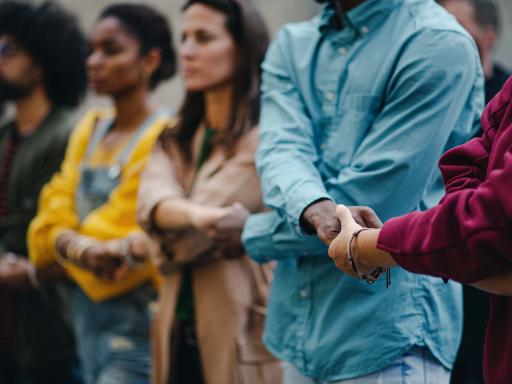A Conversation with the Fetzer Institute on its Study of Spirituality in the U.S.
The Fetzer Institute is sharing findings from their inquiry into how people of all spiritual and religious backgrounds describe their spirituality.
The Fetzer Institute is sharing findings from their inquiry into how people of all spiritual and religious backgrounds describe their spirituality.

The Fetzer Institute recently released the Study of Spirituality in the United States, a qualitative and quantitative inquiry into how people of all spiritual and religious backgrounds from across the country describe their spirituality. Through a question and answer format, Bob Boisture, president and CEO of Fetzer and Gillian Gonda, program director for movement building are sharing with us what they learned through this work.
Boisture: Fetzer’s mission—to help build the spiritual foundation for a loving world—is rooted in the conviction that we are intrinsically spiritual beings. In this case, we sought to deepen our understanding of spirituality and how—if cultivated and engaged—it can animate concrete and positive change. Early on we brought in a group of scholars and practitioners to advise us for this project and with them, we concluded that this study would be an opportunity to build on current research by exploring the open question of what lies behind traditional measures of spirituality and exploring how and why spirituality matters in the U.S. today. What surfaced as the most significant finding is that most Americans consider themselves spiritual regardless of religious affiliation. Seven-in-10 survey respondents say that spirituality is important in their lives, with the majority of people considering themselves both spiritual and religious. In addition, people who identify themselves as “highly spiritual” are more likely to say that it is important to make a difference in their communities and contribute to greater good in the world.
Key findings
Fetzer shared that they uncovered illuminating examples of rich and diverse spiritual lives and that we share more in common than we may have realized. The data makes clear that spirituality is important for most Americans and is an essential part of their lives:
More than eight out of 10 people consider themselves spiritual to some extent.
Six in 10 people aspire to be more spiritual—and the more spiritual or religious people see themselves, the more likely they aspire to be even more spiritual.
Nearly half of people say they have become more spiritual over the course of their lives.
Most engage in at least one spiritual or religious activity every week.
Fetzer intentionally designed the study to map the bridge between personal spirituality and care for community precisely so that they would learn more about the connection between the two. What they learned: People who feel highly connected to a higher power or to humanity at large are more likely to take community, civic and political action. Further, the more people identify as spiritual or religious, the more likely they are to:
Believe it’s important to “make a difference” in their communities and “contribute to greater good” in the world.
Engage with others in their communities and to take actions such as volunteering and donating.
Vote, share their voice on political and social issues and get involved in politics and social movements.
What has resonated with you and others from the key findings?
Gonda: We are heartened by the headlines in the coverage of the study—that there is a correlation between those who identify as spiritual and high levels of civic engagement. Many are interested in how this applies to our current situation—our divisive political climate, racial inequities, and ongoing challenges we face with the pandemic. How can spirituality inspire people to become more involved? To feel more connected to one another when it feels like we are pulling apart? The study also shows that there are a variety of practices people associate with their spiritual life and that the number one benefit is peace. It is an important reminder during these difficult times that we have spiritual wells to draw from.
What would you want philanthropy to know?
Gonda: These findings help give a more nuanced understanding of the spiritual lives of people in the U.S. today. It offers language and indications for how we relate to spirituality and it suggests that increased awareness of one’s inner life as it impacts outer action may give rise to lasting change. We hope professionals in philanthropy review the findings for themselves and consider how this nuanced understanding of spirituality and the role it plays impacts the change work they are implementing.
We also recognize that there is much more to learn from the research, so we are supporting additional scholarship based on the focus group and interview transcripts and survey data. One project will be conducted by the Lilly Family School of Philanthropy. The researchers will be using data from the spirituality study to focus on the potential impact of spirituality on philanthropy, compare the impact of spirituality on philanthropy versus other types of civic engagement and compare patterns of spirituality and spiritual practice. Findings will be shared next year.
Read the full report.